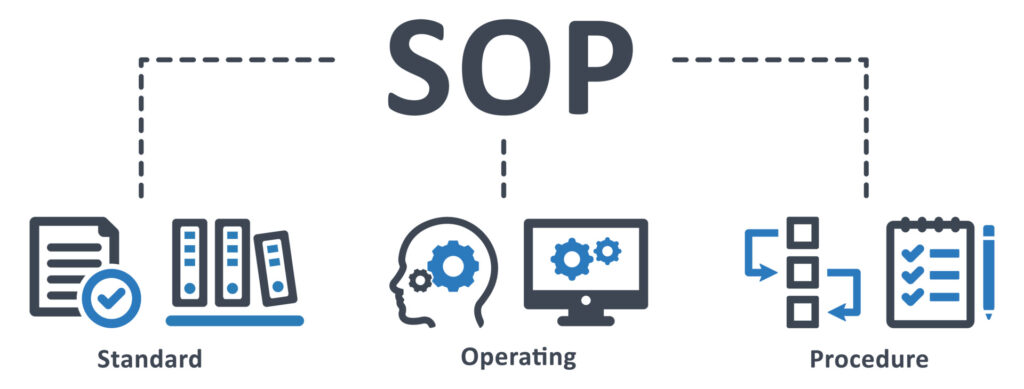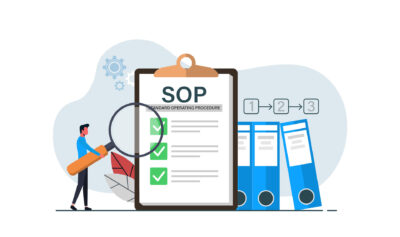Is your business experiencing problems arising from absence of standard operating procedures? You have tried to get these procedures written, but only seem to get half way through the exercise before something else more important shifts it to the back burner – yet again!
Amidst the hustle and bustle of daily business activities, an often overlooked element is the absence of Standard Operating Procedures (SOPs). Picture this: without these guiding principles, businesses can unwittingly stumble into a myriad of challenges, and significant problems.
From inefficiencies and inconsistency to compliance risks and safety concerns, the repercussions can be profound. In this dynamic landscape, SOPs illuminate the path to efficiency, consistency, and growth.
This article explores the impact of SOP deficiency and explore how it shapes the narrative of small business success.

Why SOPs are Important
A small business owner can face up to 10 problems arising from a lack of Standard Operating Procedures (SOPs).
Inefficiencies and Inconsistencies Created by Lack of Standard Operating Procedures
Inefficiencies often arise from the lack of Standard Operating Procedures (SOPs) due to the absence of clear guidelines and standardized processes.
Where employees are left to navigate tasks without a structured framework, each individual might approach the same task differently, resulting in redundant efforts, wasted time, and inconsistent outcomes.
The purpose of standard operating procedures is to provide a roadmap for employees, outlining step-by-step instructions on how to perform tasks effectively and efficiently.
Without these procedures in place, employees may spend valuable time figuring out the best way to complete a task, leading to delays and suboptimal results. Moreover, without SOPs, there is a higher likelihood of errors, rework, and misunderstandings, further exacerbating inefficiencies.
Overall, SOPs serve as a critical tool for streamlining operations, reducing waste, and improving productivity. They provide employees with clarity and guidance, enabling them to work more effectively towards common goals.
Employee Training Challenges
Onboarding new employees becomes more difficult without documented procedures. It may take longer to train new hires, and there is usually a risk of crucial steps being missed during training.
Without SOPs, trainers may struggle to provide comprehensive and consistent training to new employees. Instead of having a structured framework to follow, trainers may rely on ad hoc methods, which can lead to gaps in knowledge transfer and inconsistencies in the training process.
Overall, the absence of SOPs complicates the training process by depriving both trainers and trainees of a standardized set of guidelines to follow. This can result in longer training periods, increased frustration, and a higher risk of errors during the learning curve.
Dependency on Key Personnel
Without SOPs, businesses may become overly reliant on key personnel who hold critical knowledge. If these employees leave, it can disrupt operations and lead to knowledge loss.
The purpose of standard operating procedures is to codify best practices and institutional knowledge, ensuring that critical processes are not solely reliant on specific individuals.
Without SOPs in place, when key personnel are unavailable due to illness, resignation, or other reasons, their absence can create bottlenecks and disruptions in operations.
Moreover, dependency on key personnel increases the risk of knowledge loss. If these individuals leave the organization without transferring their expertise, it can leave a significant gap in the organization’s capabilities, leading to inefficiencies and potential errors in operations.
Quality Control Issues
SOPs provide a framework for maintaining quality standards. Without them, there’s a higher likelihood of errors or defects in products or services, which can damage the business’s reputation.
Quality control issues can stem directly from the absence of Standard Operating Procedures (SOPs) within an organization. Without documented procedures outlining specific steps and standards for each process, maintaining consistent quality becomes a significant challenge.
Moreover, the absence of SOPs makes it difficult to identify and address deviations from quality standards promptly. Without clear benchmarks to measure against, it’s harder to detect issues early in the process, leading to potentially costly errors or defects being discovered later on.
Compliance Risks
In industries with regulatory requirements, SOPs are essential for ensuring compliance. Without documented procedures, businesses may inadvertently violate regulations, leading to fines or legal issues.
Difficulty in Scaling
Lack of SOPs can hinder the scalability of the business. As operations expand, it becomes increasingly challenging to maintain consistency and efficiency without standardized processes in place.
Safety Concerns
In businesses where safety is paramount, such as manufacturing or healthcare, SOPs are necessary for ensuring employee safety. Without clear procedures, there is a higher risk of accidents or injuries.
In the absence of SOPs, employees may lack clear instructions on how to safely carry out their duties. This ambiguity increases the likelihood of accidents, injuries, or even hazardous incidents occurring in the workplace.
Furthermore, SOPs are critical for outlining safety protocols and best practices for handling equipment, chemicals, or other potentially dangerous materials. Without these procedures in place, employees may not be adequately trained or aware of proper safety measures, putting themselves and others at risk.
Moreover, the absence of SOPs can lead to inconsistencies in safety practices across different teams or shifts, further exacerbating safety concerns.
Customer Dissatisfaction
Inconsistent processes and quality can result in dissatisfied customers. Negative experiences can lead to loss of business and damage to the company’s reputation.
Without SOPs guiding employees on how to perform tasks effectively and efficiently, there is a higher likelihood of variations in the customer experience. Inconsistent service delivery, varying product quality, and miscommunication are just a few examples of issues that can arise in the absence of SOPs.
Overall, the purpose of standard operating procedures is to uphold quality standards and ensure consistency in customer interactions. Without SOPs in place, businesses risk falling short of customer expectations, ultimately leading to dissatisfaction, loss of trust, and potentially, loss of business.

Difficulty in Continuity Planning
SOPs are essential for continuity planning, especially in the event of unexpected events like natural disasters or pandemics. Without documented procedures, it’s harder to adapt and maintain operations during crises.
Without SOPs, businesses may struggle to adapt quickly and effectively to unforeseen circumstances. For example, in the event of a sudden closure or evacuation, employees may not know how to proceed with critical tasks or how to ensure the continuity of operations.
Moreover, SOPs are essential for delegating responsibilities and establishing communication protocols during emergencies. Without clear procedures in place, there may be confusion and disorganization, further hindering the ability to respond swiftly and mitigate the impact of disruptions.
Conclusion – Absence of Standard Operating Procedures
Overall, implementing SOPs is essential for small businesses to streamline operations, maintain consistency, ensure compliance, and facilitate growth.
Related Articles
- How to Create a Standard Operating Procedure that Works
- Why Job Descriptions are Important – Problems Arise Without one
References
Hayton, E (2022) Why Are SOPs Important? https://scribehow.com/library/why-are-sops-important

